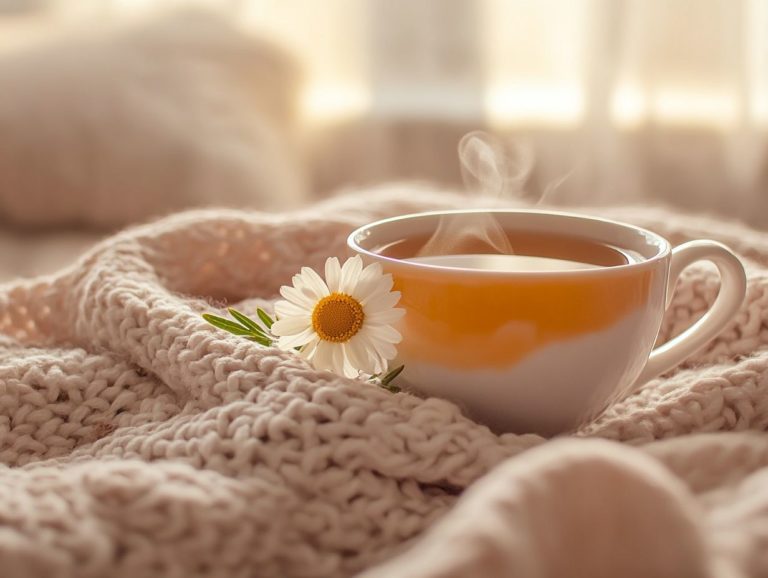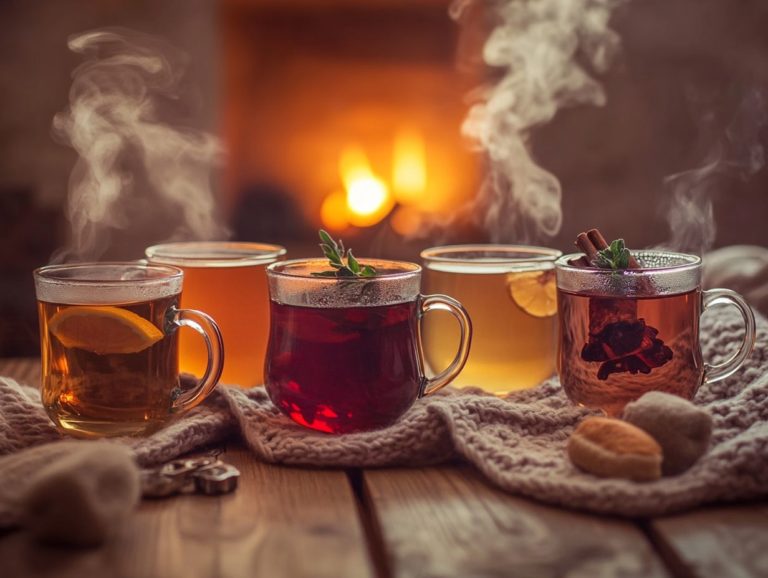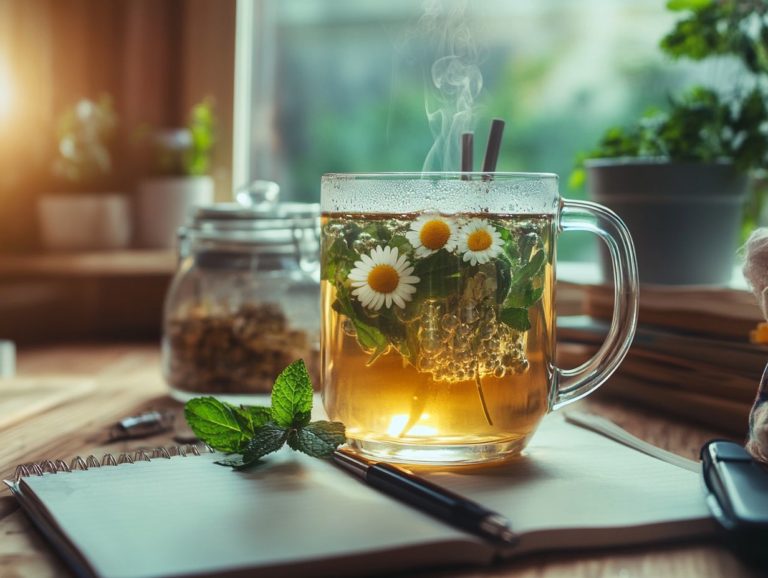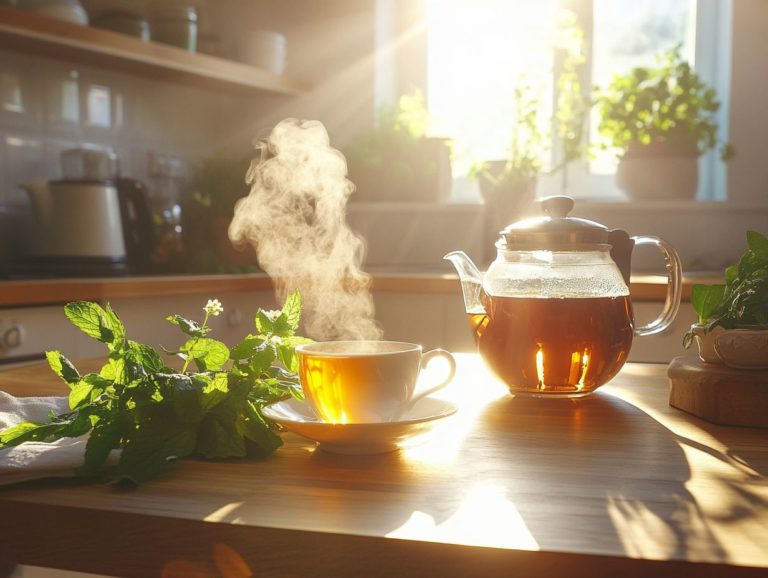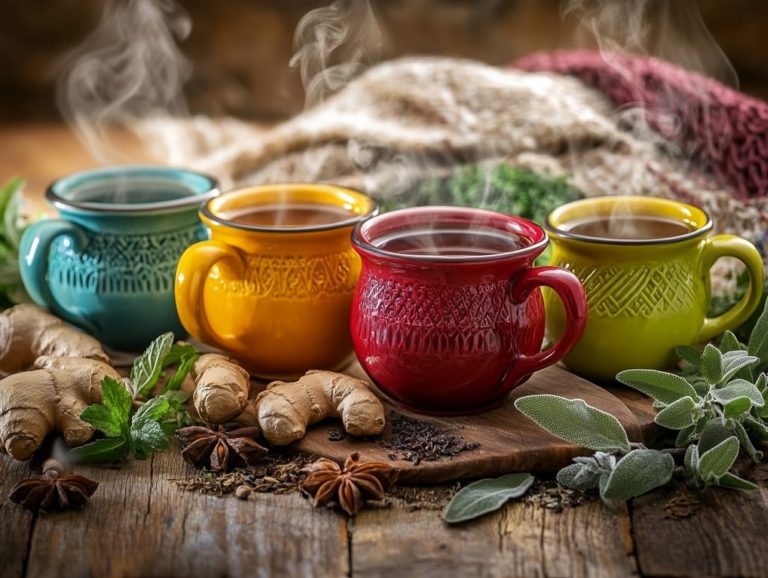5 Herbal Teas for a Good Night’s Sleep
Struggling to achieve that elusive good night s sleep? You re certainly not alone. Countless individuals grapple with insomnia and restless nights, often turning to natural remedies in search of solace.
In this exploration, you ll uncover five herbal teas famed for their calming properties: chamomile, valerian root, lavender, passionflower, and lemon balm.
Discover how these teas can aid in combating insomnia while also offering a range of additional health benefits. You’ll find preparation tips, potential side effects, and insight into when it may be wise to consult a doctor.
It’s time to say goodbye to restless nights! Embrace the soothing power of herbal teas for a transformative sleep experience!
Contents
Key Takeaways:
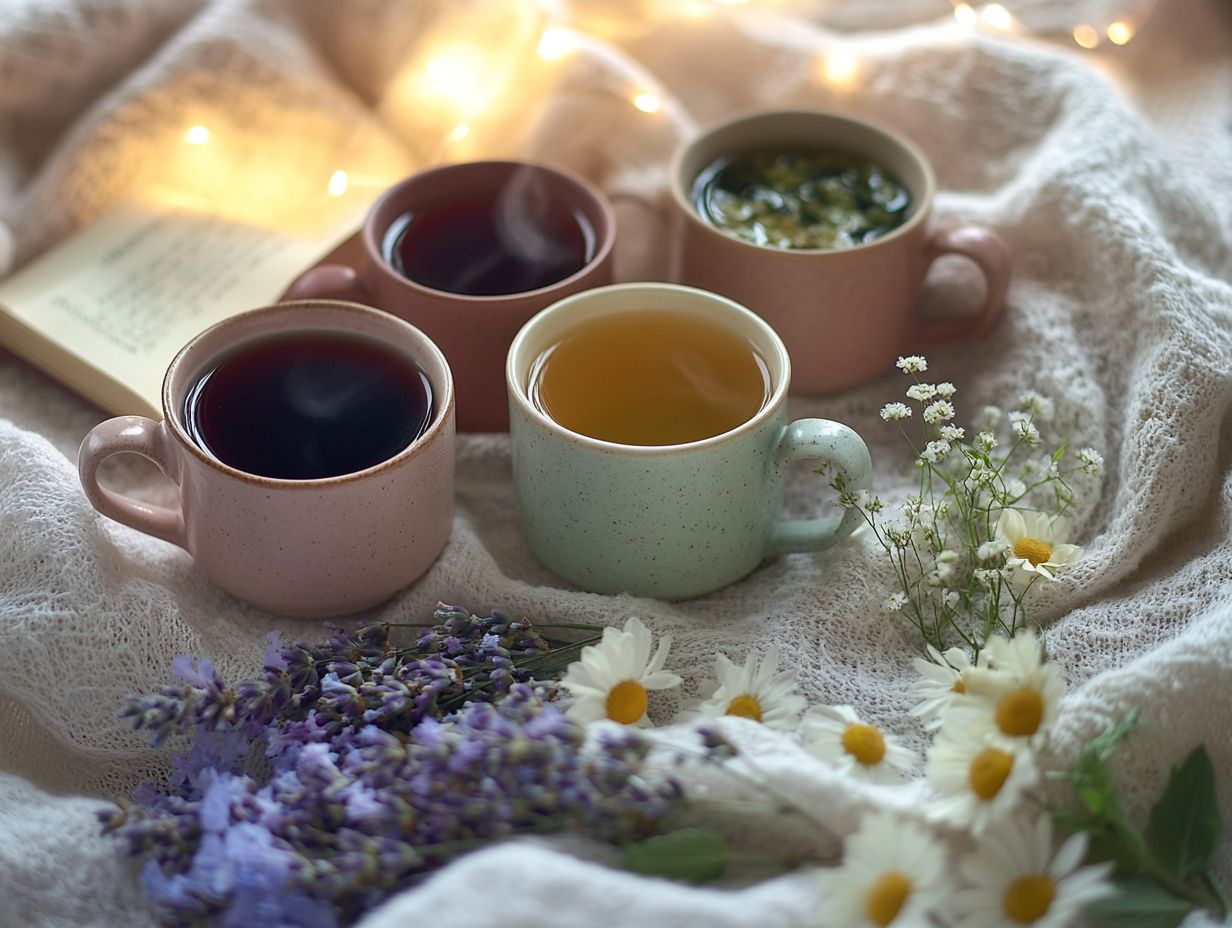
- Chamomile tea can help promote relaxation and reduce anxiety, leading to a better night’s sleep.
- Valerian root tea has been shown to improve sleep quality and reduce the time it takes to fall asleep.
- Lavender tea can help alleviate insomnia and promote a more restful sleep.
1. Chamomile Tea
Chamomile tea, renowned for its calming properties, is a beloved herbal infusion that you might find yourself reaching for when seeking relief from anxiety and better sleep quality.
It’s no wonder this soothing beverage has become a staple in countless evening routines designed for relaxation and stress reduction. This delightful drink not only fosters a comforting ritual but also taps into powerful sedative effects that can significantly improve your sleep hygiene. For those looking to kickstart their day, exploring the best herbal teas for a morning boost can be a great addition.
Experts, such as Beth Czerwony from the Cleveland Clinic, highlight that chamomile is rich in antioxidants like apigenin, which binds to receptors in your brain to promote relaxation and drowsiness.
For postpartum women navigating the challenges of sleeplessness during recovery, chamomile tea serves as a natural remedy, potentially alleviating anxiety and helping to establish healthier sleep patterns.
Its increasing recognition in herbal therapy for sleep disorders reflects a growing trend towards embracing natural remedies for stress relief and enhancing sleep quality.
2. Valerian Root Tea
Valerian root tea stands out as an effective herbal remedy for insomnia, particularly because it targets brain receptors that help calm you down. This action promotes relaxation and enhances sleep patterns, making it a valuable tool for anyone grappling with sleep disorders or anxiety.
This herbal solution has certainly caught attention for its sedative properties, drawing those experiencing high stress to explore a natural alternative. Valerian root works its magic by increasing GABA a neurotransmitter that calms the nervous system thereby fostering a sense of tranquility.
Scientific studies have demonstrated that regular consumption of valerian root can significantly enhance sleep quality. Research shows reductions in sleep latency and fewer night awakenings, which speaks volumes about its efficacy.
Specific groups, such as postpartum women, may find valerian root especially advantageous as they navigate hormonal fluctuations and the challenges of new motherhood. This makes it a promising option for boosting overall well-being.
3. Lavender Tea
Lavender tea, celebrated for its calming effects and delightful aroma, can significantly enhance your sleep quality and reduce anxiety. It’s no wonder this herbal infusion is a top choice for those seeking relaxation techniques before bedtime.
Research has shown that the compounds in lavender can positively influence your sleep patterns, helping you fall asleep faster and improving the overall duration of your slumber. Various studies suggest that lavender’s natural properties may lower stress levels, making it a popular ingredient in 5 herbal tea recipes for a relaxing evening crafted to promote tranquility.
Historically, lavender has played a vital role in traditional herbal medicine, often employed to treat anxiety disorders, underscoring its long-standing reputation as a natural remedy for the challenges of modern life.
By incorporating lavender tea into your evening routine, you can tap into these benefits and cultivate a more serene mind and body.
Don t wait any longer try these herbal teas tonight and experience the restful sleep you deserve!
4. Passionflower Tea
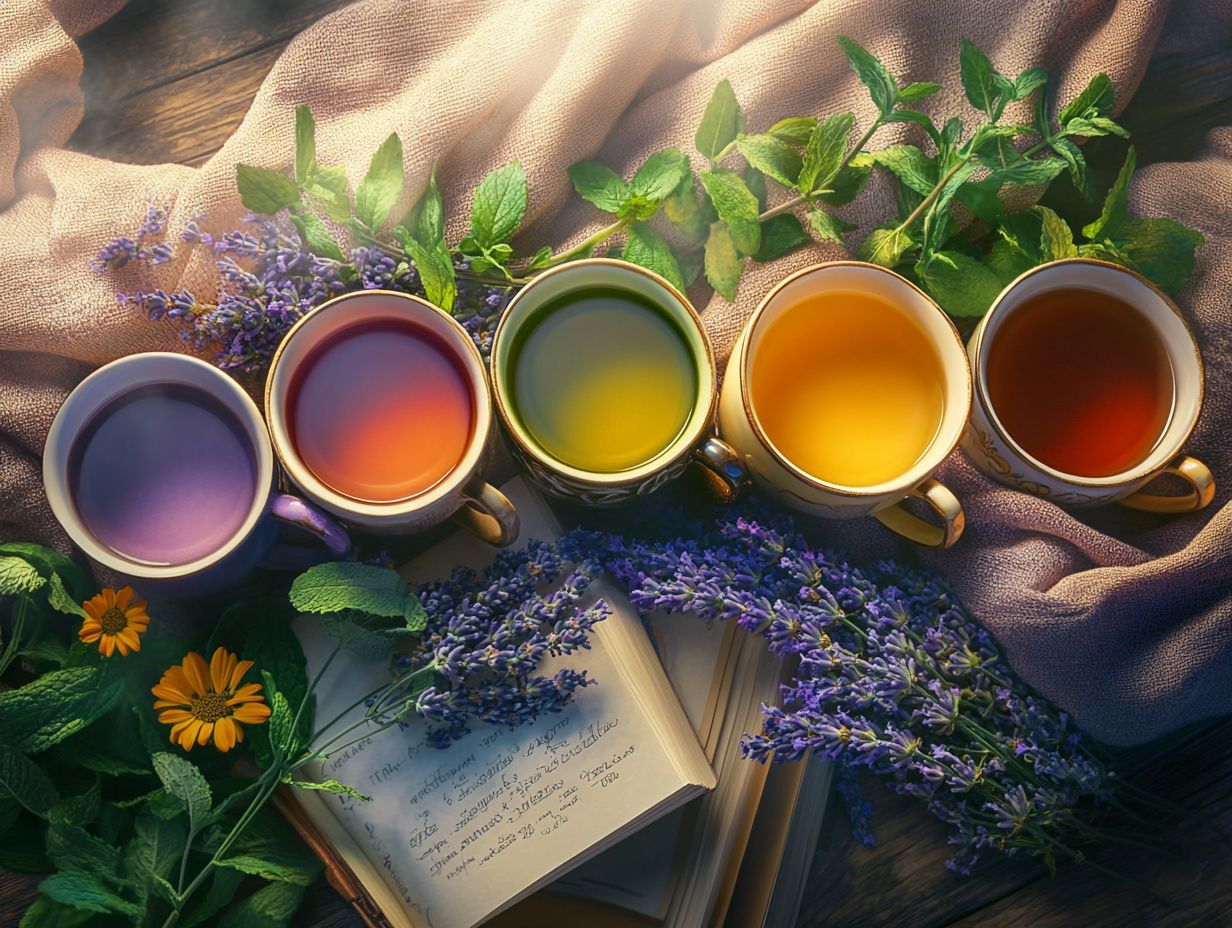
Passionflower tea is your go-to herbal tea, renowned for its remarkable anxiety-relief properties. This calming beverage helps you unwind and tackle common sleep disorders, making it a true gem in your wellness routine.
If you find yourself struggling with insomnia or feeling the weight of stress, passionflower tea can be particularly beneficial. Its natural sedative qualities promote relaxation, offering a gentle embrace at the end of your day. Unlike many caffeinated options or even other herbal teas, passionflower stands out for its ability to soothe the mind. Additionally, you might want to explore the 5 best herbal teas for digestive health, making it a must-try for your nighttime routine focused on stress reduction.
This delightful tea works by increasing gamma-aminobutyric acid (GABA), a chemical that helps calm the brain. It provides a more effective counter to anxiety than popular herbal contenders like chamomile or lemon balm. By incorporating passionflower tea into your nightly routine, you can cultivate a tranquil atmosphere that fosters restful sleep and enhances your emotional well-being. For additional options, consider trying 5 herbal teas to soothe your cold symptoms.
5. Lemon Balm Tea
Lemon balm tea is truly a gem, renowned for its soothing taste and calming properties. It s an excellent choice for managing anxiety and supporting digestive health, especially during stressful periods or as part of your bedtime tea routine.
This delightful herbal tea not only delights your palate with its refreshing lemony flavor, but it also boasts compounds that can enhance your sleep quality and reduce restlessness. Want to improve your sleep? Adding lemon balm and exploring herbal tea for anxiety relief to your nightly routine can provide a boost!
Simply brew a cup of lemon balm tea in the evening. You might want to consider blending it with chamomile or lavender, both known for their calming effects. This harmonious combination can create a more relaxing experience, promoting tranquility and better sleep. For more options, explore 5 delicious herbal tea blends to try, while also helping to ease anxiety symptoms.
Tired of Tossing and Turning? Discover How Herbal Teas Can Help!
Insomnia can arise from various sources, including stress, anxiety disorders, and poor sleep hygiene. Herbal teas like chamomile, valerian root, and lavender can become your allies in alleviating these challenges, helping promote restorative sleep through their calming properties.
Environmental factors such as noise, light, and an uncomfortable sleeping setup can significantly disrupt your ability to enjoy restful slumber. It s easy to underestimate the importance of creating a cool, dark space free from disturbances, which is essential for cultivating a serene environment conducive to sleep.
If you’re struggling with insomnia, incorporating herbal teas into your evening routine not only complements your dietary choices for better sleep hygiene but also provides a practical way to unwind. As these natural remedies take effect, you may notice improved sleep quality by adopting a consistent nightly ritual that blends relaxation techniques like gentle stretches or mindfulness practices with your chosen brew, amplifying its soothing effects. Consider exploring 5 must-try herbal preparations for better sleep to enhance your routine.
What Are the Other Benefits of These Herbal Teas?
Beyond their primary role in enhancing sleep, herbal teas like chamomile, valerian root, and lavender present a wealth of health benefits. You ll find that they improve digestive health, elevate relaxation techniques, and provide a natural approach to anxiety relief.
These herbal remedies can promote mental clarity and focus, as they re brimming with antioxidants that combat oxidative stress. Take chamomile, for instance; it s renowned for its ability to reduce inflammation and fend off emotional fatigue. Valerian root is another gem, known for soothing the mind, making it an excellent choice for navigating daily stresses. Lavender, with its delightful aroma, not only enhances your senses but has also been shown to balance mood and alleviate feelings of tension.
By seamlessly incorporating 5 herbal tea recipes for kids into your daily routine, you can tap into their calming properties, fostering a more harmonious and balanced state of mind.
How to Prepare and Consume These Herbal Teas for Maximum Effectiveness?
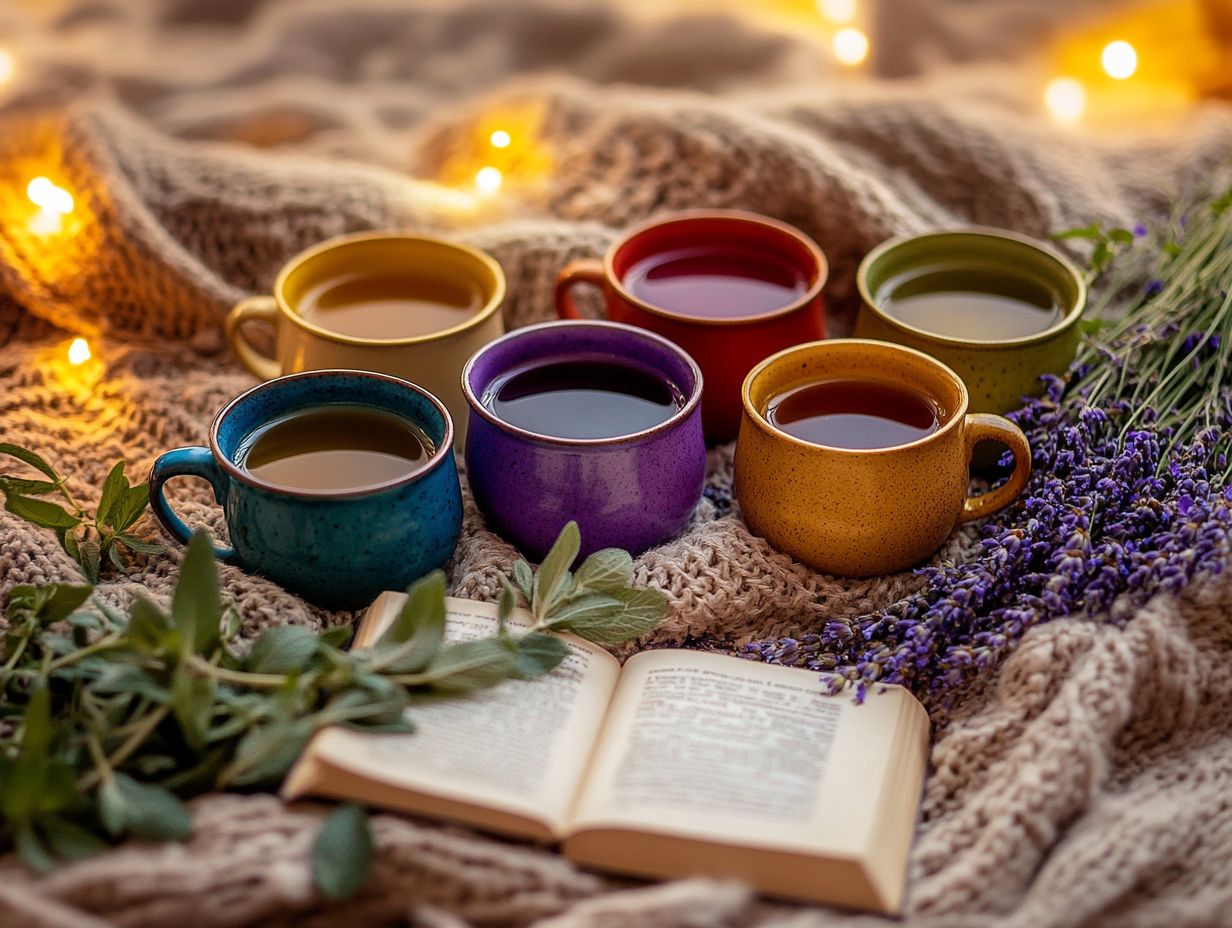
To truly harness the power of herbal teas, you need to master the art of preparation and consumption that maximizes their calming effects and enhances your sleep quality as part of your evening routine.
By focusing on key details such as water temperature, steeping time, and serving suggestions, you can craft a soothing ritual that promotes relaxation. For example, chamomile tea thrives with boiling water steeped for about five minutes, while the more delicate green tea prefers a cooler temperature and a brief steeping time.
Incorporating these delightful DIY herbal teas for wellness into your nighttime ritual can effectively signal your body to unwind, making it easier to let go of the day’s stress. With the right timing, especially in sync with your sleep schedule, these beverages not only deepen your sense of tranquility but also cultivate mindfulness, transforming an ordinary evening into a restorative experience.
Are There Any Potential Side Effects of These Herbal Teas?
While herbal teas like chamomile, valerian root, and lavender are generally safe for most, you need to be aware of potential side effects and health considerations, especially if you’re part of a sensitive group, such as postpartum women.
These soothing herbal infusions can occasionally trigger allergic reactions, resulting in symptoms like skin rashes, respiratory issues, or gastrointestinal discomfort for some individuals. Interactions with medications can pose a significant risk, particularly if you re on medications that help prevent blood clots or sedatives, as certain herbal ingredients may either enhance or diminish the effectiveness of your prescribed medications.
If you’re contemplating incorporating these teas into your routine especially if you have existing health concerns or are pregnant make sure to chat with a healthcare provider. This step ensures that you can safely enjoy the benefits of herbal teas while minimizing any potential risks.
What Are Some Tips for Improving Sleep Quality?
Improving your sleep quality often calls for a multifaceted approach. You ll want to create a relaxing environment, establish a consistent bedtime routine, and incorporate anxiety relief strategies like enjoying herbal teas into your evening preparations.
Beyond these foundational steps, it’s essential to focus on environmental factors that are critical for creating a good sleeping environment. Keeping your bedroom at a comfortable temperature, ideally between 60-67 degrees Fahrenheit, can significantly enhance your comfort and promote deeper sleep.
Soft, dim lighting not only signals to your body that it s time to wind down but also helps reduce eye strain, creating a serene atmosphere that invites relaxation.
Practicing calming techniques such as deep breathing or gentle stretching before bed can help ease tension. Integrating a warm cup of chamomile tea for better sleep into your nightly routine not only aids in unwinding but also transforms into a delightful ritual that fosters tranquility and prepares your mind for rejuvenating slumber.
When Should One Consult a Doctor for Sleep Issues?
Consulting a doctor about sleep issues is essential, especially when insomnia lingers despite your best lifestyle changes. If you re dealing with underlying health concerns like anxiety disorders or chronic stress that are taking a toll on your sleep quality and overall well-being, it s time to seek professional help.
You should take notice if you experience symptoms such as excessive daytime sleepiness, frequent nightmares, or difficulty concentrating, as these could signal deeper issues at play. Ignoring sleep disturbances can worsen both physical and psychological health problems, creating a downward spiral in your well-being.
Crafting a treatment plan that addresses both mental and physical health is vital for optimal recovery. When sleep disorders are intertwined with anxiety or depression, a nuanced approach is necessary one that not only improves your sleep quality but also helps ease anxiety and stress. This comprehensive strategy is key to achieving lasting improvements in your overall health.
Frequently Asked Questions
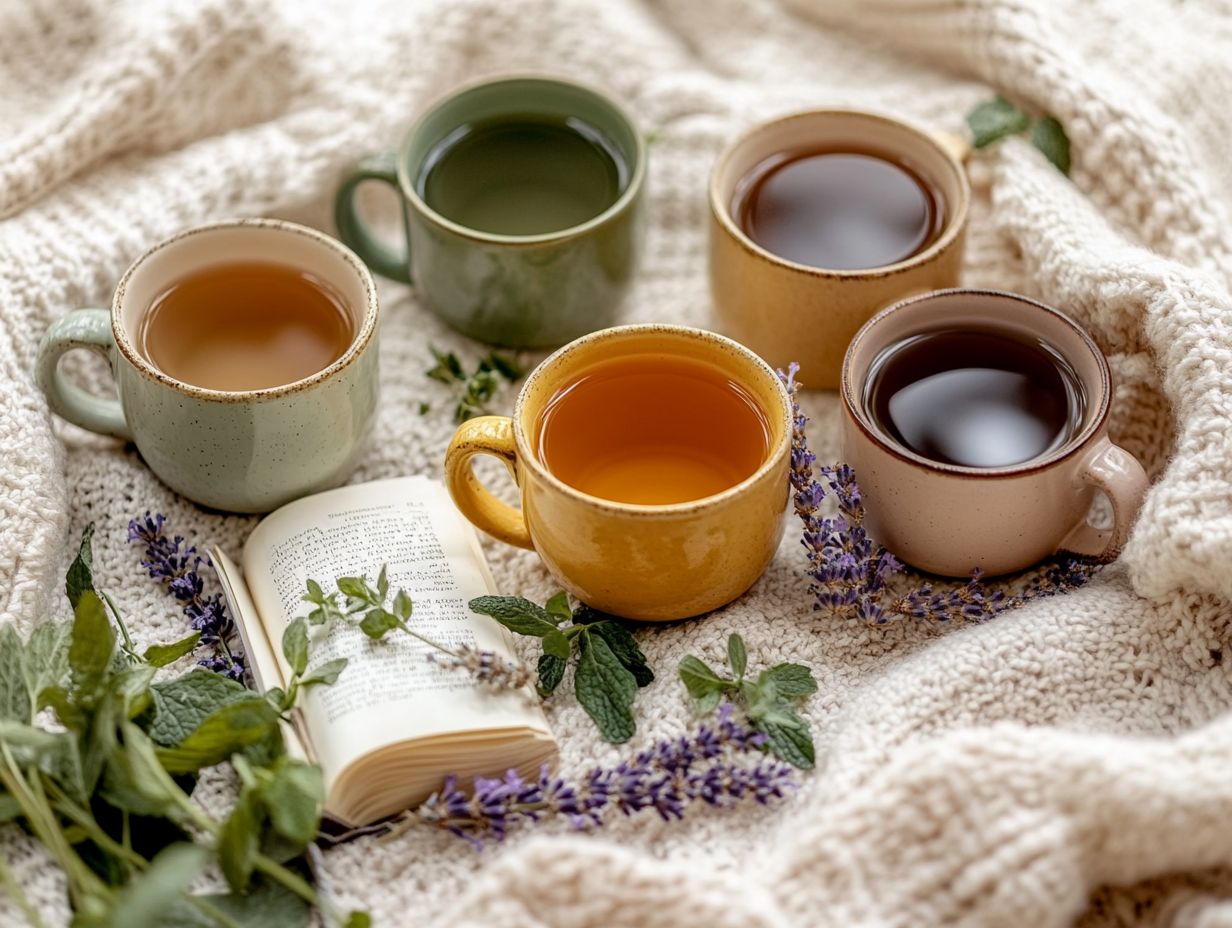
What are the top 5 herbal teas for a good night’s sleep?
The top five herbal teas for a good night’s sleep are chamomile, valerian root, passionflower, lavender, and lemon balm.
How does chamomile tea help with sleep?
Chamomile contains apigenin, a natural ingredient that promotes relaxation. This can lead to better sleep quality.
Can valerian root tea really help with insomnia?
Yes! Valerian root has been a natural remedy for insomnia for centuries. It calms the nervous system to promote better sleep.
What makes passionflower tea a good sleep aid?
Passionflower increases levels of GABA, a substance that helps reduce anxiety. This can enhance sleep quality and lessen insomnia symptoms.
How does lavender tea help with sleep?
Lavender has a soothing aroma that reduces anxiety. It also contains natural ingredients that promote restful sleep.
Is lemon balm tea safe to drink before bed?
Lemon balm is safe for most people to drink before bed. It has a mild calming effect that can help you relax and sleep better. Always consult a healthcare professional before trying new herbal teas.

